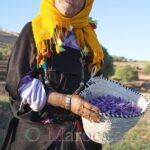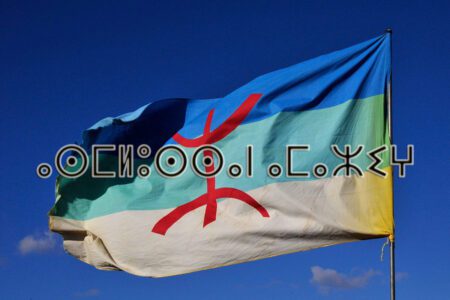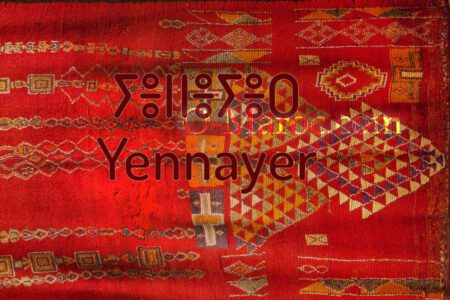Diversity of status, traditions…
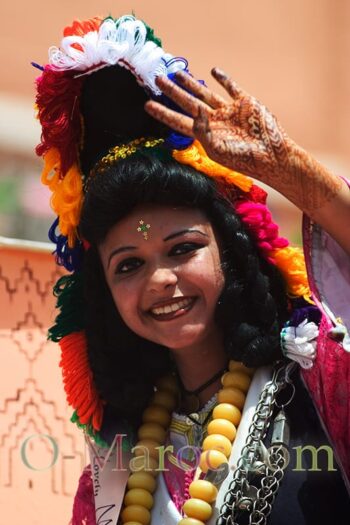
Is there a difference between a woman’s place in Berber society, in Moroccan society and in Muslim society? Undoubtedly, or rather a range of differences, some positive, some negative.
It’s probably impossible to say whether it’s better to be a Moroccan woman of Berber or Arab origin, or an Algerian woman…. But it is by the women, and their dress, for example, that tourists will be able to recognise the few Arab villages scattered across Berber country.
These women, who are suddenly cloaked in heavy black veils that don’t let anything through, some even wearing gloves. What a contrast with the colourful veils, either black embroidered with bright wools, or simply red, yellow or green….
A Berber woman has her head covered, dressed decently in long skirts, but she does not hide her face.
With the possible exception of women of Essaouira. But that’s undoubtedly history talking, and the numerous kidnappings in the past of these girls renowned for their beauty, who went on to populate the harems of Fez and Marrakech. In those days, there were more Jews and foreigners than Moroccans in Essaouira….
Moreover, in rural society, the veil has more of a customary connotation than a religious one. It is not a cloth that hides a woman outside her family and is immediately removed within the family circle, as is the case in other Muslim countries. It is an instrument of modesty, the equivalent of which is found in men (and to an extreme among Tuaregs, whose women are lightly veiled, while men keep their heavy veil, out of respect, even eating behind their chèche, so as not to reveal their mouths), and an element of status.
Young girls wear indiscriminate headscarves, like those seen in France, but as soon as they are married, they proudly wear the colourful “zif” that was previously forbidden to them.
Imagine the field of sparkling poppies at a gathering of women in the Draa valley, who enter one after the other covered in a long black embroidered cotton dress, followed by light-coloured dresses, red, red and yellow, red and green scarves, embroidered headbands, silver pendants…
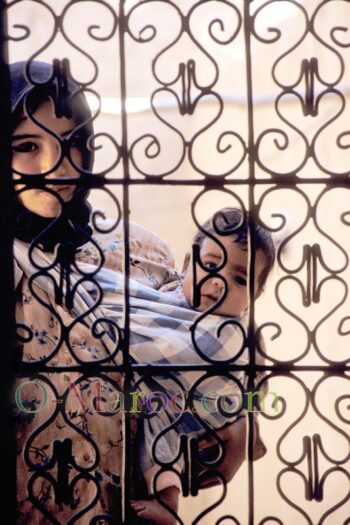
A Berber woman can go to the market to sell the produce from her vegetable garden or her livestock.
With the possible exception of the Rifa women, who are confined to their homes, so much so that they don’t go to the public hammam. But that’s undoubtedly history talking, and protection against piracy in the Mediterranean.
Berbers are not traditionally polygamous. And less and less so, with the impact of the new family law, which allows a woman to request a divorce to her advantage if her husband wants to impose a second wife on her.
But they’re a people of lovers.
In fact, the unfortunate Imilchil's fiancés are a Berber couple. And it’s because of them, or thanks to them, that every year, during the three days of this moussem, it is said that girls and boys can choose each other freely, and marry as they wish, ignoring arranged marriage plans… if they don’t bow, out of respect, to their parents’ wishes.
Berbers traditionally do not beat their wives.
In fact, for the Tuareg it is a great shame to let themselves go to such extremes, and it is the angry husband who will be looked down upon for not knowing how to contain himself.
Men and women have quite separate spheres, and the two sexes rarely mix, even within the family.
Married young – at 25 you’re starting to feel like an old maid (and how is that any different from the France of 50 years ago?), very soon the mother of a large family, the Berber woman evolves in a laughing and voluble gynaecology where men are sometimes a little afraid to set foot.
At every free moment, laughter breaks out and singing begins, punctuated by a simple mint tea on an iron tray, or the handle of a knife on the table. They talk loudly, calling out to each other, the babies sleep in the din, and the men, cautious, think that their wives are too exuberant for them. And they’re right. The women’s conversations sometimes have a crudeness that would make more than one European woman blush.
Portraits of women in Morocco
The mother-in-law reigns supreme over the douar, with a firm hand on her husband, sons, daughters-in-law and grandchildren, and woe betide anyone who does not carry out her wishes immediately.
But her power stops at the door of the family home. She does not take part in the management of the family’s affairs, only that of her own property, the dowry she received by marriage contract, and the assets inherited from her family. Morocco has a system of strict separation of assets, and a woman can never be dispossessed of what she has.
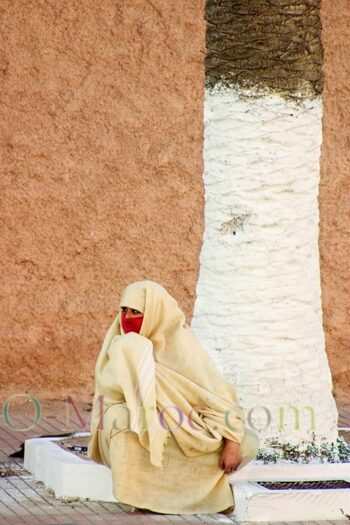
But… but the man is the head of the family, and he can – or rather could, before the new moudawana (family code), prevent her from making an investment or spending money that was deemed unreasonable. Money was then blocked, inaccessible to both men and women.
Moreover, women inherit less than their brothers; legally, a man’s share is double that of a woman.
When they do inherit, moreover, Kabyle women are forbidden from inheriting, for example. A system put in place to preserve the integrity of the land.
Under these conditions, a woman’s ‘wealth’ remains relative, and far inferior to that of a man, who inherits, works and has access to his money without needing his wife’s consent….
Like the man, the woman has the right to ask for a divorce. Or rather, whereas the man had the right to repudiate her, the woman could ask for a divorce if the man seriously failed in his duties (here too, the new Moudawana is gradually trying to redress the balance). The woman is a negligible part of the couple and the family. Divorced, she cannot keep her children if she remarries, because a child cannot be brought up by a man other than his father. It doesn’t matter if the father has remarried.
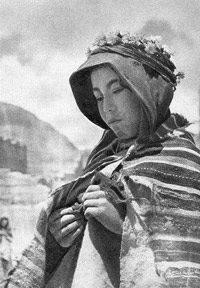
Here we have focused on women in the traditional rural society of southern Morocco. But even in the city, even in Casablanca, under a more liberated guise, Moroccan women seek to push back the walls built around them by tradition. It’s unthinkable for a woman to live alone, and a widow, even a well-established one, such as a company executive, will go back to live with a family member. A woman on her own in the street is seen as a beckoning call, a walking invitation.
In Morocco, women don’t question the veil. A girl is free to do as she pleases – if she is free in the face of pressure from the environment – and we have seen certain meetings where two girls with hair got lost in the middle of several hundred women.
“In hair”… Until the Second World War, in our countries, a “decent” woman didn’t go out “in hair”, she went out wearing a hat… And European women lost their long skirts with the factories of the First World War, when men had to be replaced as prisoners at work. The “headscarf issue” is a French issue, but one that arises in Europe, in a country with a secular tradition.
In Morocco, it has no meaning. The veil is a choice. Feminists are fighting for much more concrete and essential issues, such as literacy (although today girls go to school like boys, twenty years ago this was not the case, and many adult women are illiterate), financial support for women who were repudiated before the new Moudawana came into force, and the next steps in the Moudawana (such as the fate of children born out of wedlock), financial support for women who were repudiated before the new Moudawana came into force, future advances in the Moudawana (such as, for example, the fate of children born out of wedlock and out of betrothal, little bastards with no name, no status, no clan to belong to), the possibility of working and improving one’s lot.
A traditional society cannot be judged by the yardstick of our European model, and it probably takes a long time to understand which areas of freedom are necessary there and which are, at least now, superfluous, so different is the context from ours.
But the next time you stop in a village, go and talk to the women. They don’t speak English nor French, maybe even not a lot of Arabic, but their eyes, their smiles and their laughter will tell you a lot.
 A typo or syntax error? You can select the text and hit Ctrl+Enter to send us a message. Thank you! If this post interested you, maybe you can also leave a comment. We'd love to exchange with you !
A typo or syntax error? You can select the text and hit Ctrl+Enter to send us a message. Thank you! If this post interested you, maybe you can also leave a comment. We'd love to exchange with you !



